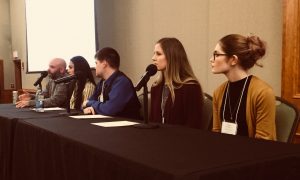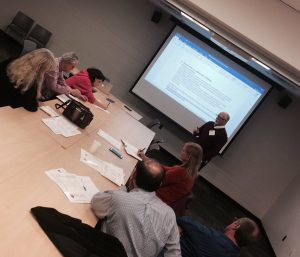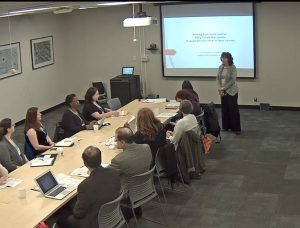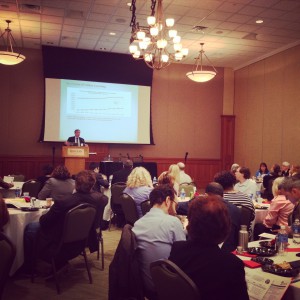2020 eLearning Conference (virtual)
Rutgers–Camden’s 7th annual eLearning Conference was presented virtually, over two days, November 12-13, 2020.
2019 eLearning Conference
Our 6th annual Rutgers University–Camden Faculty eLearning Conference took place on April 11, 2019. Over 100 faculty from institutions throughout the region attended. Faculty from Rutgers-Camden, University of Pennsylvania, Drexel, and Stockton presented, in addition to others. 96% of surveyed attendees reported that they were “likely” or “very likely” to recommend the conference to a colleague.
Here’s some feedback we received from the 2019 conference:
- “Honestly, this conference is awesome! I had so many people at my table talking about how engaging it is and how it exceeded their expectations. It was really cool to hear all of that from people at various universities.”
- “I thought it was a great and inspiring day which helped me feel supported and more confident about teaching online.”
- “I really look forward to this conference. It’s probably one of the best in terms of topics, organization, quality, and the branded gift items are nice. The food is always good, too!!”
- “I really like the pace of the conference and feeling like I can dip in and out and still learn a lot.”
The 2019 Faculty Advisory Council included: Bill FitzGerald, Teaching Matters & Assessment Center and English; Dinesh Iyer, Management; Tracie Paulson, Biology; Dana Pilla, World Languages; and Wanda Williams, Nursing.
- View the full agenda and presentation descriptions from the 2019 eLearning Conference
- View post-conference report, eLC2019
2018 eLearning Conference

Our 5th annual Rutgers University–Camden Faculty eLearning Conference took place on March 1, 2018. Over 120 people attended.
Eighty-five percent of faculty who attended plan to incorporate new technological tools and/or pedagogical methods in their teaching, according to the post-conference survey. Survey participants indicated they plan to begin using a variety of tools in their classrooms: student polling tools, social media, Adobe Spark, OER, and VoiceThread.
Overall, our 2018 attendees had a positive learning experience at the conference. Here are some examples of comments:
- “I really liked the format. I enjoyed the short, engaging sessions that provided a wide array of topics to choose from.”
- “I thought the conference was amazing. I really enjoy when something is well organized and runs so smoothly. I think one of the best features was that each session was only 30 minutes, which enabled the presenters to have low-stress and the attendees to see a variety of sessions as opposed to seeing only 1 or 2. It was really run beautifully and breakfast and lunch were much appreciated. It was an enjoyable, professional, and academic day.”
- “This was a great conference, well organized with a lot of informative speakers and conversations. Thank you so much for hosting and organizing it.”
- “I really enjoyed the conference and took away something new from each session I attended. Great job! I’m already looking forward to next year’s conference.”
The 2018 Faculty Advisory Council included: Akon Ekpo, Marketing; Bill FitzGerald, Teaching Matters & Assessment Center and English; Dinesh Iyer, Management; Tracie Paulson, Biology; and Dana Pilla, World Languages.
- View the full agenda and presentation descriptions from the 2018 eLearning Conference
- View post-conference report, eLC2018
2017 eLearning Conference
 The 4th annual Faculty eLearning Conference took place on March 30, 2017, and featured faculty speakers and attendees from Rutgers University–Camden and Camden County College. Over 120 people attended.
The 4th annual Faculty eLearning Conference took place on March 30, 2017, and featured faculty speakers and attendees from Rutgers University–Camden and Camden County College. Over 120 people attended.
For the first time, the conference featured a student panel called “From the other side: students dish on online learning,” which ran over lunch. The panel was popular amongst attendees, which they commented on in the post-conference evaluation:
- “The most impactful session to me was the lunch one where they had the panel of students of various programs and backgrounds tell their experiences with many of the elearning technologies and tools. Those views are invaluable in seeing if, how, and to what extent a method is effective, as well as a lot of the shortcomings a student may face in the way of their studies and classes.”
- “I really enjoyed the student panel! It was great to hear their opinion and what worked and didn’t work for them personally.”
- “The student panel was wonderful. I was happy to hear that they felt their online classes were just as challenging as their traditional courses.”
The conference offered approximately 25 sessions, including traditional presentations, panel discussions, and roundtable discussion. A panel led by librarian Zara Wilkinson shared tips and challenges regarding using Open Educational Resources (OER) in the classroom. Presenters discussed building rapport in online courses, using social media to increase engagement in the face-to-face classroom, incorporating student blogs, and more. Faculty demonstrated how to use tools such as WordPress, Socrative, and PollEverywhere.
The 2017 advisory council included: Thanks to our Faculty Advisory Council at Rutgers University–Camden: Sarah Allred, Psychology; Dinesh Iyer, Management; Bill FitzGerald, Teaching Matters & Assessment Center and English; Carol Kaufman-Scarborough, Marketing and Business Leader Development Program; Amy Savage, Biology; Mary Wunnenberg, Nursing; and Melissa Yates, Philosophy.
- View the full agenda and presentation descriptions from the 2017 eLearning Conference.
- View post-conference report, eLC2017
2016 eLearning Conference
 Rutgers University–Camden faculty welcomed colleagues from community college partners for the first time at the 3rd annual Faculty eLearning Conference on April 7, 2016, as both fellow attendees and presenters. Faculty from Rutgers–Camden, Camden County College, Rowan College at Burlington County, and Rowan College at Gloucester County collaborated and learned from each other in record numbers. Attendance grew by more than 60% since our 2015 conference. As in previous years, the goals of the conference included:
Rutgers University–Camden faculty welcomed colleagues from community college partners for the first time at the 3rd annual Faculty eLearning Conference on April 7, 2016, as both fellow attendees and presenters. Faculty from Rutgers–Camden, Camden County College, Rowan College at Burlington County, and Rowan College at Gloucester County collaborated and learned from each other in record numbers. Attendance grew by more than 60% since our 2015 conference. As in previous years, the goals of the conference included:
- To demystify online and hybrid teaching and learning.
- To excite interest in different models of education, as supported by education and research.
- To allow faculty to share experiences of engaging students with new tools, both in the classroom and online.
A new track was added in 2016, offering roundtable discussions. These sessions allowed small groups of faculty to discuss topics such as “Using online discussions to augment your face-to-face courses” and “Critiques and peer reviews in online courses.” In addition to sharing at roundtable discussions and presenting on pedagogical innovation, conference presenters also demonstrated various technologies, including Kaltura, VoiceThread, Canvas, and OfficeMix. Attendance Rutgers University–Camden Camden County College Rowan College at Burlington County Rowan College at Gloucester County After the conference, seventy-two out of our 128 attendees completed a survey to evaluate their experience. Survey results showed that attendees came to the conference with widely varied teaching experience: about half had never taught an online or hybrid course (50% and 46% respectively). Twenty-four percent of attendees had between one and five years of experience teaching online; 26% had over five years of experience. Thirty-three percent of attendees had between one and five years of experience teaching hybrid courses; 21% had over five years of experience. Due to the wide range of expertise brought by conference attendees, workshops were labeled “Beginner,” “Intermediate,” and “Advanced,” and overall positive feedback from the survey suggests attendees found conference workshops valuable no matter their experience level.
The 2016 advisory council included: Cindy Ayres, Nursing; Stuart Charmé, FAS Philosophy & Religion; Bill Fitzgerald, TMAC and FAS English; Dan Hart, FAS Psychology; Carol Kaufman-Scarborough, SBC Marketing; and Kwangwon Lee, FAS Biology.
- View the full agenda and presentation descriptions from the 2016 eLearning Conference
- View post-conference report, eLC2016
2015 eLearning Conference
 Our second annual Rutgers University–Camden Faculty eLearning Conference took place on Tuesday, April 28, 2015. It included multiple tracks and expanded themes, including not only online and hybrid teaching, but also new technologies in the classroom and teaching live to distance students.
Our second annual Rutgers University–Camden Faculty eLearning Conference took place on Tuesday, April 28, 2015. It included multiple tracks and expanded themes, including not only online and hybrid teaching, but also new technologies in the classroom and teaching live to distance students.
Some faculty presenters from our 2014 conference, such as Carol Kaufman-Scarborough (Marketing) and Charlene Mires (History), returned to share new experiences, while many new presenters joined the conference program. Presentations included: Meredith Bak (Childhood Studies) and the Digital Studies Center both reflected on using Twine in the classroom. Students from Stuart Charmé’s Master’s in Liberal Studies course video conferenced in from across the country to share the student perspective in online learning. Sunil Shende (Computer Science) and Georgia Arbuckle (Chemistry) shared their experiences using iPad apps in the traditional classroom.
The keynote speaker, Dr. Anthony Picciano from CUNY, spoke about the history and evolution of online learning in his talk entitled “The online learning landscape: implications for teaching & learning.”
The 2015 advisory council included: Cindy Ayres, Nursing; Stuart Charmé, FAS Philosophy & Religion; Bill Fitzgerald, TMAC and FAS English; Dan Hart, FAS Psychology; Carol Kaufman-Scarborough, SBC Marketing; and Kwangwon Lee, FAS Biology.
- View the full agenda and presentation descriptions from the 2015 eLearning Conference
- View post-conference report, eLC2015
2014 eLearning Conference
On April 29, 2014, the Teaching Matters and Assessment Center and Department of Instructional Design & Technology came together to host Rutgers-Camden’s inaugural eLearning Conference. Brief faculty presentations focused on faculty sharing their experiences in moving courses into the hybrid format, the online format, or incorporating online technologies in their traditional, face-to-face courses.
Presenters included a variety of faculty members, such as Dan Hart (Psychology), Cindy Ayres (Nursing), and Charlene Mires (History), who discussed technologies like PollEverywhere, ThingLink, and Sakai blogs and how these technologies have created a more interactive learning experience for students. Attendees also were able to participate in hands-on activities, using iPads to create whiteboard recordings with Educreations and to participate in the conference backchannel.
Dr. Karen Swan, the keynote speaker from University of Illinois- Springfield, discussed the importance of teacher and social presence in online education. Many of the points faculty presenters discussed were reflected in the research presented by Swan.
The 2014 advisory council included: Janice Beitz, Nursing; Stuart Charmé, FAS Philosophy & Religion; Bill Fitzgerald, TMAC and FAS English; Dan Hart, FAS Psychology; Tyler Hoffman, FAS English; and Carol Kaufman-Scarborough, SBC Marketing.
